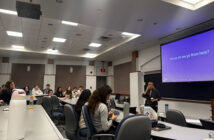What is college for?

Gregory Skutches, Lehigh’s director of Writing Across the Curriculum.
If you listen closely to students when they speak candidly about their Lehigh experience, you would have to conclude, it seems to me, that college is for but one thing: making sure students miss out on their own lives.
Think about it. Students come to Lehigh with high expectations and enormous pressure to excel academically. They’ve been told that college will be the best years of their lives but also their one and only shot at success as adults.
From the students’ perspective, everything they do — all the homework and reading, writing and studying, completion of group projects — is to prepare for the future. Homework and tests are for getting good grades; good grades are for high GPAs; high GPAs are for getting internships, then jobs or gaining admission to graduate or professional school.
Students are well trained in this drill. The competition to get into a good college has taught them that personal interest and meaning are luxuries in the race to success, so that even when a Lehigh professor tries to appeal to genuine curiosity, students often resist. Understandably. They’ve been burned before. It’s a cost-benefit thing, and their razor-sharp ability to do the calculus is impressive.
It also works. Lehigh students are smart and highly skilled at getting good grades. Good for them. They’ve learned well.
The problem is that working only for the future robs the present of meaning. Future success is held hostage in order to coerce compliance now.
Marshall McLuhan told us that “the medium is the message” in describing the effects of mass media on society, arguing that the real purpose of the content offered by radio and television was to gather together an audience to be compliantly present for the advertisements. Conformity around the mass consumption of products people didn’t need. That was the message.
In higher education, the content is course subject matter, and the medium is testing and grades. In practice, day after day, semester after semester, the purpose of knowledge is to earn high scores on tests and perform well for a perpetual stream of gatekeepers. Conformity around the necessity of working hard in the absence of meaning. Capitalism bootcamp. That’s the message.
The result is a hamster wheel of endlessly deferred meaning carried forward into adult life.
It seems that this approach to learning is intentional here at Lehigh. In his TEDx talk titled “The Essential Function of Universities,” Provost Nathan Urban claims that universities are for building up a storehouse of knowledge to be drawn on in the face of some unforeseen crisis in the future.
Urban says, “The most important things universities do is teach students knowledge and skills before they need them, discover knowledge before we know that it’s useful, and build an environment in which diverse groups of people connect with each other before they even know why they might want to connect.”
The irony here is that we already have a large storehouse of knowledge that directly undermines this very claim.
For example, in Experience and Education, American philosopher and educational reformer John Dewey writes, “The ideal of using the present simply to get ready for the future contradicts itself. It omits, and even shuts out, the very conditions by which a person can be prepared for his future.”
Dewey goes on to explain why this approach fails: “We always live at the time we live and not at some other time, and only by extracting at each present time the full meaning of each present experience are we prepared for doing the same thing in the future. This is the only preparation which in the long run amounts to anything.”
Dewey’s book was published in 1938.
More recently, cognitive neuroscience and psychology have shown the importance of experiential learning, intrinsic motivation, creativity, play, growth mindset, and the value of meaningful engagement in the present moment.
It seems clear to me that someday in the future we will look back on our current system of education and see it for what it is: grossly ineffective, a cause of much unneeded suffering and a barbaric constraint on human progress and flourishing.
We already know better. Lehigh can and should be a carnival of learning, discovery and wonder, all in the bright fullness of the present moment. We just need the will and courage to act.






Comment policy
Comments posted to The Brown and White website are reviewed by a moderator before being approved. Incendiary speech or harassing language, including comments targeted at individuals, may be deemed unacceptable and not published. Spam and other soliciting will also be declined.
The Brown and White also reserves the right to not publish entirely anonymous comments.
1 Comment
Have yet to meet someone as thoughtful, as insightful, as supportive as Dr. Greg Skutches. Great read.